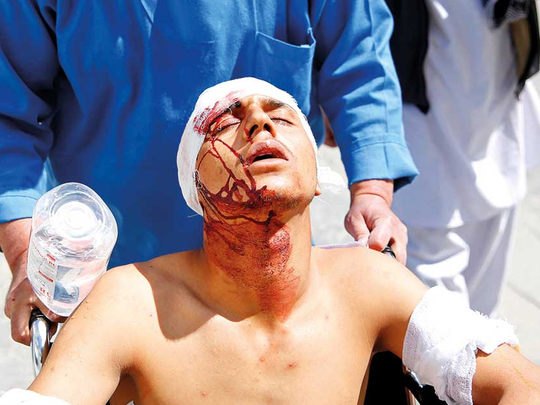
KABUL: A suicide bomber on Wednesday killed at least 26 people, many of them teenagers, in front of Kabul University, officials said, as Afghans took to the streets to celebrate their new year holiday.
There was no immediate claim of responsibility for the deadly attack — the fifth suicide bombing in the Afghan capital in recent weeks — but the Taliban denied involvement on Twitter.
Another 18 people were wounded in the blast, interior ministry spokesman Nasrat Rahimi said, “all of them civilians”.
A suicide attacker on foot detonated himself in front of a hospital, Rahimi said. The hospital is opposite Kabul University.
The bomber was less than 200 metres from Karte Sakhi shrine where many Afghans gather every year to mark Nawruz, which is the traditional Persian new year holiday.
The same shrine was attacked in October 2016 when Daesh gunmen killed 18 people gathered to mark Ashura, an important date for many Muslims, especially Shiites.
A man who was standing metres from where the explosion happened told Tolo News that he saw “at least four bodies in blood” on the ground.
There was no immediate claim of responsibility for the assault but Taliban and Daesh militants have increasingly targeted the war-weary city in recent months.
The blast comes days after a Taliban suicide attacker blew up a bomb-laden car in the Afghan capital, causing multiple casualties.
Little incentive for talks
The Taliban faces growing pressure to take up a recent offer by Afghan President Ashraf Ghani of peace talks to end the 16-year war. So far it has given only a muted response.
This latest suicide attack underscores the growing challenge facing Afghan and foreign forces to protect the already heavily militarised city.
Authorities had increased security ahead of Nawruz festivities, which militants have previously struck with deadly force.
General John Nicholson, who leads US and Nato forces in Afghanistan, recently told reporters that protecting Kabul was a priority for foreign troops.
“Kabul is our main effort right now, to harden Kabul, to protect the people of Kabul and the international community that are here because of the strategic impact that has and the importance to the campaign,” Nicholson said.
The latest attack comes as US Chairman of Joint Chiefs of Staff General Joseph Dunford visits Afghanistan to assess the military campaign against insurgents.
Despite calls for the Taliban to sit down with the Afghan government, it appears to have few reasons to negotiate.
The group has been resurgent since the withdrawal of US-led Nato combat troops at the end of 2014, taking back territory and devastating Afghanistan’s beleaguered security forces.
In October, insurgents controlled or influenced nearly half of Afghanistan’s districts — double the percentage in 2015, the US government’s office of the Special Inspector General for Afghanistan Reconstruction said in January.
Over the same period, the watchdog said, the number of districts under Afghan government control or influence fell to its lowest level since December 2015.












